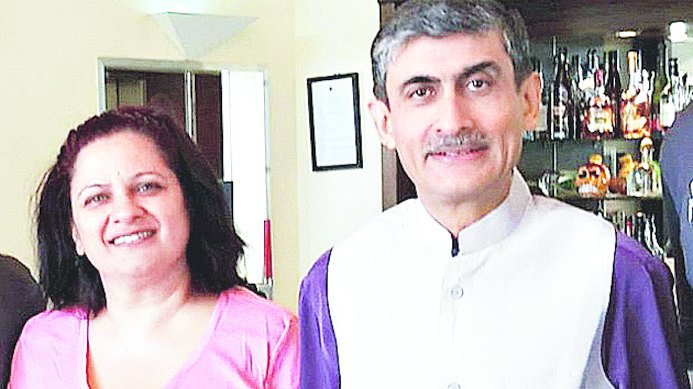
New Delhi, June 27: India has recalled its high commissioner to New Zealand after his cook told local police the envoy's wife had assaulted him, sparking fears of a repeat of the events that led to diplomat Devyani Khobragade's New York arrest in 2013.
The decision to call high commissioner Ravi Thapar back to New Delhi followed a month of hectic back-channel negotiations to settle the case quietly and diplomatically without a public investigation, senior officials said.
But India failed to convince New Zealand of the innocence of Thapar's wife Sharmila and was advised by Wellington that the envoy's repatriation might be the best way of bringing diplomatic closure to the case, the officials said.
The cook, an Indian, had alleged that the high commissioner, too, had threatened to assault him. The external affairs ministry has launched its own probe and brought the cook back to India.
"Though no charges were pressed by the service staff member, the ministry will investigate the matter further," foreign office spokesperson Vikas Swarup said today. "The ministry takes all such cases very seriously."
Thapar could not be reached despite multiple attempts, but the New Zealand Herald quoted the high commissioner as rejecting the allegations against his wife.
Some New Zealand publications described the Thapars' treatment of the cook as "slavery". Thapar had been posted to New Zealand in December 2013 and was to have stayed in Wellington till December 2016.
"I'm going but to take care of my mum because my dad passed away last year," the newspaper quoted Thapar as saying. "I can't keep up 13,000km away just talking to her on the phone."
Swarup confirmed that Thapar had already been reassigned to headquarters but officials would not reveal the role he would take up in New Delhi.
The alarm bells first rang at South Block early on May 10 when Thapar called Monika Mohta, the joint secretary (South) who handles ties with New Zealand at foreign office headquarters, officials said.
Thapar told Mohta the cook had left suddenly, without some of his belongings, and had been missing for a few hours.
The mission in Wellington informed both the police and the New Zealand foreign office, which told India's external affairs ministry on May 11 that the cook had appeared before the police and accused Sharmila of assaulting him, and Thapar of threatening to assault him.
But when the Wellington police asked Thapar if they could question him, the high commissioner refused and forbade any of his mission staff or those working at his residence from speaking with the police, an Indian official familiar with the case said.
Thapar, a law graduate from the University of California, Berkeley, cited diplomatic immunity to refuse permission for questioning. But New Zealand authorities questioned his interpretation.
The Vienna Convention on Diplomatic Relations insists that the premises of a foreign mission and the high commissioner's residence are "inviolable", making it impossible for the police to legally enter those premises.
Article 29 of the convention also describes the "person of a diplomatic agent" and his family as inviolable and specifies that they cannot be arrested or detained.
A diplomatic agent and his family are also exempt from any "criminal jurisdiction" of the country where they are posted, under the Vienna convention.
But while diplomats and their families are "not obliged to give evidence as a witness" under the convention, this exemption does not extend to non-diplomatic members of the mission staff and their families.
The Wellington police argued that they ought to be allowed to question non-diplomatic members of the staff at the high commissioner's residence.
The apparent stand-off between the high commissioner and New Zealand authorities threatened to spiral into a public law-and-order incident -- something the foreign office was desperate to avoid because of past embarrassments, officials said.
In 2009, the press counsellor at the Indian consulate in New York, Neena Malhotra, was accused of treating a domestic hand like a slave.
Two years later, the then Indian consul-general in New York, Prabhu Dayal, was accused by a district attorney of inhuman treatment of his 45-year-old maid Santosh Bhardwaj. Both Malhotra and Dayal were quickly brought back to India.
But it was Khobragade's arrest and strip search in December 2013, on charges that she had enslaved her daughters' nanny while serving as deputy consul-general in New York, that exposed the foreign office like never before to the diplomatic pitfalls of such crises.
Angry that, unlike the past cases, the American authorities had gone ahead and arrested an Indian diplomat without first informing the mission in New York, New Delhi withdrew a slew of privileges it had extended to the US embassy here.
India also called off scheduled meetings with senior American officials and threatened action against the US embassy school and the mission's other facilities here on charges of violating Indian law.
But the incident also left New Delhi chastened.
When Thapar alerted Mohta about the Wellington incident, South Block quickly contacted New Zealand's foreign office and was relieved to discover that the cook was willing to not press charges if guaranteed safe passage back to India.
Foreign secretary S. Jaishankar sent a team of officials to Wellington to broker an agreement with the cook and the New Zealand authorities.
The cook returned to India on May 28 but an unconvinced New Zealand nudged the Indian team to get New Delhi to probe the allegations against Thapar and his wife, the officials said.










